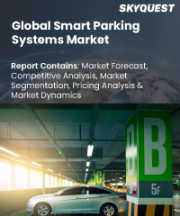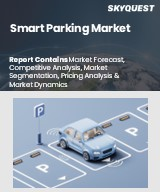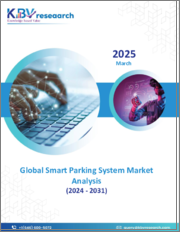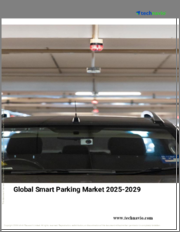
|
시장보고서
상품코드
1757419
스마트 주차 시장 평가, 방식 유형별, 기술 유형별, 최종사용자 유형별, 지역별, 기회 및 예측(2018-2032년)Global Smart Parking Market Assessment, By Method Type, By Technology Type, By End-user Type, By Region, Opportunities and Forecast, 2018-2032F |
||||||
세계 스마트 주차 시장은 IoT, AI, 센서 기술의 급속한 발전으로 2025-2032년의 예측 기간 동안 11.31%의 연평균 복합 성장률(CAGR)을 나타내고, 2024년 138억 7,000만 달러에서 2032년 326억 9,000만 달러로 성장할 것으로 예측됩니다. 도시와 기업이 주차 공간을 최적화하고 교통 혼잡을 완화하는 데 도움을 주고 있습니다. 실시간 데이터 분석, 자동 결제 시스템, 모바일 통합이 표준 기능이 되고 있습니다.
스마트 주차는 운영 효율을 높이고, 운전자의 시간을 절약하며, 주차를 할 필요가 없어 배기가스 배출을 줄일 수 있습니다. 정부와 민간 이해관계자들은 이러한 솔루션에 대한 투자를 늘리고 있으며, 스마트 주차는 전 세계 스마트 시티 인프라의 중요한 구성 요소로 자리 잡고 있습니다.
예를 들어, 독일에서는 2023년 1월 슈투트가르트 공항에서의 성공적인 시범운영에 이어 전국적으로 고도로 자동화된 주차 시스템이 시작되었습니다. 보쉬 AG와 APCOA는 베를린, 함부르크, 뮌헨을 포함한 15개 주요 도시의 주차장에 메르세데스 S클래스, EQS와 같은 차량의 무인 주차를 가능하게 하는 기술을 장착할 계획입니다. 이 시스템은 지능형 인프라와 차량 커넥티비티를 활용하여 자동차가 자율적으로 주차하고 돌아올 수 있도록 하는 것으로, 도시 모빌리티 혁신의 큰 진일보를 이룰 것입니다.
목차
제1장 프로젝트의 범위와 정의
제2장 조사 방법
제3장 미국 관세의 영향
제4장 주요 요약
제5장 고객의 소리
- 응답자 인구통계
- 브랜드 인지도
- 구입 결정시에 고려되는 요소
- 미충족 요구
제6장 세계의 스마트 주차 시장 전망, 2018년-2032년
- 시장 규모 분석과 예측
- 금액별
- 시장 점유율 분석과 예측
- 방식 유형별
- 센서 기반 스마트 주차
- 모바일 앱 기반 스마트 주차
- 번호판 인식 기반 스마트 주차
- 기타
- 기술 유형별
- 초음파 센서
- 레이더 센서
- 영상 기반 센서
- 무선통신 네트워크
- 데이터 분석 및 클라우드 컴퓨팅
- 최종사용자 유형별
- 상업 주차장
- 정부 및 자치체 주차장
- 헬스케어 주차장
- 기타
- 지역별
- 북미
- 유럽
- 아시아태평양
- 남미
- 중동 및 아프리카
- 기업별 시장 점유율 분석(주요 5개사 및 기타 - 금액별, 2024년)
- 방식 유형별
- 2024년 시장 맵 분석
- 방식 유형별
- 기술 유형별
- 최종사용자 유형별
- 지역별
제7장 북미의 스마트 주차 시장 전망, 2018년-2032년
- 시장 규모 분석과 예측
- 금액별
- 시장 점유율 분석과 예측
- 방식 유형별
- 센서 기반 스마트 주차
- 모바일 앱 기반 스마트 주차
- 번호판 인식 기반 스마트 주차
- 기타
- 기술 유형별
- 초음파 센서
- 레이더 센서
- 영상 기반 센서
- 무선통신 네트워크
- 데이터 분석 및 클라우드 컴퓨팅
- 최종사용자 유형별
- 상업 주차장
- 정부 및 자치체 주차장
- 헬스케어 주차장
- 기타
- 국가별 점유율
- 미국
- 캐나다
- 멕시코
- 방식 유형별
- 국가별 시장 평가
- 미국의 스마트 주차 시장 전망, 2018년-2032년
- 시장 규모 분석과 예측
- 시장 점유율 분석과 예측
- 캐나다
- 멕시코
- 미국의 스마트 주차 시장 전망, 2018년-2032년
적용되는 모든 지역과 국가에 대해 모든 부문이 제공됩니다.
제8장 유럽의 스마트 주차 시장 전망, 2018년-2032년
- 독일
- 프랑스
- 이탈리아
- 영국
- 러시아
- 네덜란드
- 스페인
- 튀르키예
- 폴란드
제9장 아시아태평양의 스마트 주차 시장 전망, 2018년-2032년
- 인도
- 중국
- 일본
- 호주
- 베트남
- 한국
- 인도네시아
- 필리핀
제10장 남미의 스마트 주차 시장 전망, 2018년-2032년
- 브라질
- 아르헨티나
제11장 중동 및 아프리카의 스마트 주차 시장 전망, 2018년-2032년
- 사우디아라비아
- 아랍에미리트(UAE)
- 남아프리카
제12장 Porter의 Five Forces 분석
제13장 PESTLE 분석
제14장 시장 역학
- 시장 성장 촉진요인
- 시장이 해결해야 할 과제
제15장 시장 동향과 발전
제16장 사례 연구
제17장 경쟁 구도
- 시장 리더 주요 5개사의 경쟁 매트릭스
- 주요 5개사의 SWOT 분석
- 시장 주요 기업 10개사의 상황
- Amano McGann, Inc
- 기업 개요
- 주요 경영진
- 제공되는 주요 제품
- 주요 재무 상황(보고 시점)
- 주요 시장 초점 및 지역 존재감
- 최근 동향/협업/파트너십/합병과 인수
- Continental AG
- DONGYANG ADVANCED PARKING CO., LTD
- IEM SA
- IPS Group, Inc.
- KLAUS Multiparking GmbH
- Robert Bosch GmbH
- ParkSmart
- SWARCO AG
- Barcelona Smart Technologies, SL(URBIOTICA)
- Amano McGann, Inc
위에 언급된 회사는 시장 점유율에 따른 순위를 보유하지 않으며, 조사 작업 중 이용 가능한 정보에 따라 변경될 수 있습니다.
제18장 전략적 제안
제19장 회사 소개 및 면책조항
LSH 25.07.03Global smart parking market is projected to witness a CAGR of 11.31% during the forecast period 2025-2032, growing from USD 13.87 billion in 2024 to USD 32.69 billion in 2032F, owing to rapidly evolving advancements in IoT, AI, and sensor technologies, helping cities and businesses optimize parking spaces and reduce traffic congestion. Real-time data analytics, automated payment systems, and mobile integration are becoming standard features.
Smart parking improves operational efficiency, saves time for drivers, and lowers emissions by reducing the need for circling. Governments and private stakeholders are increasingly investing in these solutions, making smart parking a key component of smart city infrastructure across the globe.
For instance, in January 2023, Germany launched highly automated parking systems nationwide, following successful trials at Stuttgart Airport. Bosch AG and APCOA planned to equip 15 major city garages including Berlin, Hamburg, and Munich with technology that enables driverless parking for vehicles such as Mercedes S-Class and EQS. The system uses intelligent infrastructure and vehicle connectivity, allowing cars to park and return autonomously, marking a major step in urban mobility innovation.
Urbanization and AI-IoT Integration to Shape the Global Smart Parking Market Dynamics
Increasing urbanization is leading to dense traffic and parking shortages in major cities worldwide. With rising vehicle ownership, the demand for efficient parking management is surging. Traditional parking systems are inefficient, contributing to wasted fuel and time. Smart parking provides real-time space availability, easing congestion and enhancing mobility. Municipalities are investing in smart parking to improve urban planning and reduce the environmental impact of prolonged idling, positioning it as a vital solution for modern urban challenges.
For instance, in May 2025, Chandigarh announced to launch AI-driven smart parking system across 87 paid sites, featuring real-time availability updates through sensors, cameras, and mobile technology. The project includes valet services, Pink Zones for women, and reserved areas for EVs and seniors. Smart Parking Project Committee states that the AI system is likely to transform parking by predicting availability, enhancing security, and offering a seamless, citizen-centric urban experience.
The integration of Internet of Things (IoT) and Artificial Intelligence (AI) is significantly transforming the smart parking landscape. IoT enables seamless communication between vehicles and infrastructure, while AI-powered algorithms predict space availability and optimize traffic flow. These technologies enhance user experience through real-time updates and automated systems, making parking more convenient and efficient. As connected devices become more prevalent and affordable, their use in smart parking systems continues to expand, driving the market forward.
Government Smart City Initiatives and Contactless Solutions to Fuel Smart Parking Market Demand
Governments are implementing smart city projects to enhance infrastructure and urban living. Parking systems are a core focus due to their direct impact on traffic and emissions. Public-private partnerships are being established to deploy sensor-based, automated parking solutions. Regulatory push for sustainability and digital transformation is also accelerating the adoption of smart parking technologies. Funding grants, pilot programs, and infrastructure modernization efforts are aligning with the growing need for intelligent transport systems, further supporting market growth.
For instance, in February 2025, India's Mumbai's Brihanmumbai Municipal Corporation launched an AI-powered smart parking app, enabling citizens to pre-book parking slots and make cashless payments. The system uses real-time data, cameras, and sensors to guide drivers to available spaces, reducing the need to search for parking and easing traffic congestion. This initiative is a key part of BMC's 2025-26 smart city and sustainable mobility push.
Post-pandemic consumer behavior has driven up demand for contactless technologies across sectors, including parking. Users prefer mobile-based payments, automated gates, and reservation systems that eliminate physical interactions. Smart parking platforms provide these services through intuitive apps and integrated systems. This shift not only boosts user safety and convenience but also opens new revenue streams through dynamic pricing and personalized services.
In January 2022, Delhi launched the AI-powered 'MyParkings' smart parking app, revolutionizing urban mobility. Using IoT and AI, the app allows users to view real-time parking availability, book slots remotely, and enjoy paperless, cashless transactions. Features include automatic number plate recognition, smart QR code scanning, and integration with FASTag and E-Challan, making parking seamless and reducing congestion and environmental impact in the city.
Radar Sensors Dominate the Global Smart Parking Market Share
Based on technology type, radar sensors are the leading segment within the smart parking market due to their accuracy, range, and reliability in detecting available parking spaces. Unlike ultrasonic sensors, radar operates effectively in varying weather and lighting conditions, making it suitable for both indoor and outdoor applications. These sensors provide real-time occupancy data and can be integrated seamlessly with mobile applications and vehicle systems. Radar-based solutions are increasingly used in advanced driver-assistance systems (ADAS) for autonomous parking and space detection. Their durability and minimal maintenance requirements also make them attractive for large-scale municipal deployments.
Radar's ability to distinguish between stationary and moving objects enhances vehicle and pedestrian safety. With continued innovations and falling hardware costs, radar sensors are becoming the preferred choice for smart parking infrastructure in both public and commercial spaces, contributing to their growing market share.
For instance, in November 2024, San Antonio International Airport in the United States deployed an AI-powered smart parking system, using advanced radar sensors and license plate recognition for seamless entry and exit. Travelers register once, then enjoy ticketless, automated payments and the option to reserve spots in advance. This innovation streamlines parking, reduces congestion, and enhances convenience for airport visitors, setting a new standard for smart parking across the nation.
North America Dominates the Global Smart Parking Market Size
North America leads the smart parking market due to a combination of advanced infrastructure, early technology adoption, and strong government support for smart mobility solutions. Major cities such as New York, Los Angeles, and Toronto are early adopters of connected parking systems, using IoT-based sensors and AI-driven analytics to improve traffic flow and optimize space usage. The region benefits from a mature automotive ecosystem and a high penetration of smartphones, enabling seamless mobile-based parking solutions.
Regional trends include an emphasis on electric vehicle (EV) charging integration within parking systems, autonomous parking capabilities, and increasing use of dynamic pricing models. Public-private partnerships and funding programs such as the U.S. Smart Cities Initiative provide crucial support for ongoing innovation. Additionally, the presence of leading tech firms and solution providers in the region fuels R&D and accelerates adoption, making North America a global leader in smart parking technologies.
For instance, in February 2023, North America launched one of its largest municipal smart parking projects in Arlington County, Virginia. Canadian IoT company eleven-x will install 5,000 wireless sensors to provide real-time parking data, helping drivers quickly find available spots, reduce congestion, and lower emissions. This milestone supports Arlington's goals for sustainability and improved quality of life for residents and visitors.
Impact of the U.S. Tariffs on the Global Smart Parking Market
U.S. tariffs on imported electronics, semiconductors, and related hardware have had a moderate impact on the smart parking market. Many smart parking solutions rely on sensors, processors, and communication modules, a significant portion of which are sourced from countries affected by tariffs. This has increased the overall cost of implementation and slowed down deployment in some regions. However, the push for local sourcing and manufacturing within North America is partly offsetting these challenges, encouraging domestic innovation and supply chain diversification to reduce dependency on imports.
Key Players Landscape and Outlook
Leading companies in the smart parking market are focusing on vertical integration of software and hardware to offer end-to-end solutions. Strategic partnerships with municipalities, infrastructure developers, and automotive OEMs are helping to expand deployment networks. Innovation in AI-based analytics, cloud platforms, and mobile applications is a priority to improve real-time monitoring and payment convenience. Many players are investing in scalable, modular systems that suit both large metropolitan cities and smaller urban areas. Another key trend is the use of data monetization models-where anonymized parking data is leveraged for city planning, retail footfall analysis, and advertising revenue. Moreover, pilot programs and free trials are used as customer acquisition strategies to promote adoption among hesitant city councils and private operators.
For instance, in November 2023, Continental AG was awarded the CES 2024 Innovation Award for its Radar Vision Parking technology, recognized in the Vehicle Tech and Advanced Mobility category. This cutting-edge system combines high-resolution surround radars and cameras to enable precise, close-range vehicle parking, supporting Level 3 and 4 automated driving functions. It offers early parking slot detection, a seamless 360 degrees view, and enhanced safety features, surpassing traditional ultrasonic sensors. This marks Continental's eighth consecutive year receiving this prestigious award, underscoring its leadership in smart parking innovation.
Table of Contents
1. Project Scope and Definitions
2. Research Methodology
3. Impact of U.S. Tariffs
4. Executive Summary
5. Voice of Customers
- 5.1. Respondent Demographics
- 5.2. Brand Awareness
- 5.3. Factors Considered in Purchase Decisions
- 5.4. Unmet Needs
6. Global Smart Parking Market Outlook, 2018-2032F
- 6.1. Market Size Analysis & Forecast
- 6.1.1. By Value
- 6.2. Market Share Analysis & Forecast
- 6.2.1. By Method Type
- 6.2.1.1. Sensor-based Smart Parking
- 6.2.1.2. Mobile App-Based Smart Parking
- 6.2.1.3. License Plate Recognition-based Smart Parking
- 6.2.1.4. Others
- 6.2.2. By Technology Type
- 6.2.2.1. Ultrasonic Sensors
- 6.2.2.2. Radar Sensors
- 6.2.2.3. Image-based Sensors
- 6.2.2.4. Wireless Communication Networks
- 6.2.2.5. Data Analytics and Cloud Computing
- 6.2.3. By End-user Type
- 6.2.3.1. Commercial Parking
- 6.2.3.2. Government and Municipality Parking
- 6.2.3.3. Healthcare Parking
- 6.2.3.4. Others
- 6.2.4. By Region
- 6.2.4.1. North America
- 6.2.4.2. Europe
- 6.2.4.3. Asia-Pacific
- 6.2.4.4. South America
- 6.2.4.5. Middle East and Africa
- 6.2.5. By Company Market Share Analysis (Top 5 Companies and Others - By Value, 2024)
- 6.2.1. By Method Type
- 6.3. Market Map Analysis, 2024
- 6.3.1. By Method Type
- 6.3.2. By Technology Type
- 6.3.3. By End-user Type
- 6.3.4. By Region
7. North America Smart Parking Market Outlook, 2018-2032F
- 7.1. Market Size Analysis & Forecast
- 7.1.1. By Value
- 7.2. Market Share Analysis & Forecast
- 7.2.1. By Method Type
- 7.2.1.1. Sensor-based Smart Parking
- 7.2.1.2. Mobile App-Based Smart Parking
- 7.2.1.3. License Plate Recognition-based Smart Parking
- 7.2.1.4. Others
- 7.2.2. By Technology Type
- 7.2.2.1. Ultrasonic Sensors
- 7.2.2.2. Radar Sensors
- 7.2.2.3. Image-based Sensors
- 7.2.2.4. Wireless Communication Networks
- 7.2.2.5. Data Analytics and Cloud Computing
- 7.2.3. By End-user Type
- 7.2.3.1. Commercial Parking
- 7.2.3.2. Government and Municipality Parking
- 7.2.3.3. Healthcare Parking
- 7.2.3.4. Others
- 7.2.4. By Country Share
- 7.2.4.1. United States
- 7.2.4.2. Canada
- 7.2.4.3. Mexico
- 7.2.1. By Method Type
- 7.3. Country Market Assessment
- 7.3.1. United States Smart Parking Market Outlook, 2018-2032F*
- 7.3.1.1. Market Size Analysis & Forecast
- 7.3.1.1.1. By Value
- 7.3.1.2. Market Share Analysis & Forecast
- 7.3.1.2.1. By Method Type
- 7.3.1.2.1.1. Sensor-based Smart Parking
- 7.3.1.2.1.2. Mobile App-Based Smart Parking
- 7.3.1.2.1.3. License Plate Recognition-based Smart Parking
- 7.3.1.2.1.4. Others
- 7.3.1.2.2. By Technology Type
- 7.3.1.2.2.1. Ultrasonic Sensors
- 7.3.1.2.2.2. Radar Sensors
- 7.3.1.2.2.3. Image-based Sensors
- 7.3.1.2.2.4. Wireless Communication Networks
- 7.3.1.2.2.5. Data Analytics and Cloud Computing
- 7.3.1.2.3. By End-user Type
- 7.3.1.2.3.1. Commercial Parking
- 7.3.1.2.3.2. Government and Municipality Parking
- 7.3.1.2.3.3. Healthcare Parking
- 7.3.1.2.3.4. Others
- 7.3.1.2.1. By Method Type
- 7.3.1.1. Market Size Analysis & Forecast
- 7.3.2. Canada
- 7.3.3. Mexico
- 7.3.1. United States Smart Parking Market Outlook, 2018-2032F*
All segments will be provided for all regions and countries covered
8. Europe Smart Parking Market Outlook, 2018-2032F
- 8.1. Germany
- 8.2. France
- 8.3. Italy
- 8.4. United Kingdom
- 8.5. Russia
- 8.6. Netherlands
- 8.7. Spain
- 8.8. Turkey
- 8.9. Poland
9. Asia-Pacific Smart Parking Market Outlook, 2018-2032F
- 9.1. India
- 9.2. China
- 9.3. Japan
- 9.4. Australia
- 9.5. Vietnam
- 9.6. South Korea
- 9.7. Indonesia
- 9.8. Philippines
10. South America Smart Parking Market Outlook, 2018-2032F
- 10.1. Brazil
- 10.2. Argentina
11. Middle East and Africa Smart Parking Market Outlook, 2018-2032F
- 11.1. Saudi Arabia
- 11.2. UAE
- 11.3. South Africa
12. Porter's Five Forces Analysis
13. PESTLE Analysis
14. Market Dynamics
- 14.1. Market Drivers
- 14.2. Market Challenges
15. Market Trends and Developments
16. Case Studies
17. Competitive Landscape
- 17.1. Competition Matrix of Top 5 Market Leaders
- 17.2. SWOT Analysis for Top 5 Players
- 17.3. Key Players Landscape for Top 10 Market Players
- 17.3.1. Amano McGann, Inc
- 17.3.1.1. Company Details
- 17.3.1.2. Key Management Personnel
- 17.3.1.3. Key Products Offered
- 17.3.1.4. Key Financials (As Reported)
- 17.3.1.5. Key Market Focus and Geographical Presence
- 17.3.1.6. Recent Developments/Collaborations/Partnerships/Mergers and Acquisitions
- 17.3.2. Continental AG
- 17.3.3. DONGYANG ADVANCED PARKING CO., LTD
- 17.3.4. IEM SA
- 17.3.5. IPS Group, Inc.
- 17.3.6. KLAUS Multiparking GmbH
- 17.3.7. Robert Bosch GmbH
- 17.3.8. ParkSmart
- 17.3.9. SWARCO AG
- 17.3.10. Barcelona Smart Technologies, S.L. (URBIOTICA)
- 17.3.1. Amano McGann, Inc
Companies mentioned above DO NOT hold any order as per market share and can be changed as per information available during research work.



















